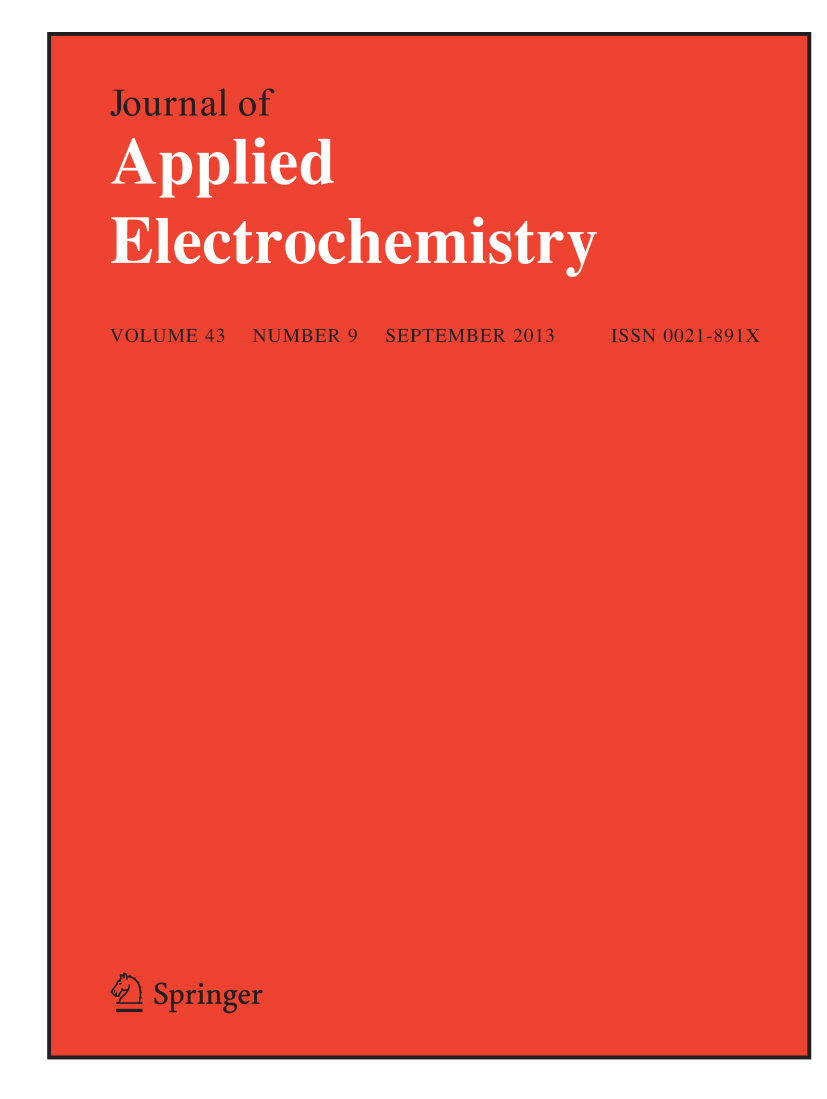Nickel and/or platinum modified crystalline silicon–carbon composites and their electrochemical behaviour towards the hydrogen evolution reaction
IF 3
4区 工程技术
Q3 ELECTROCHEMISTRY
引用次数: 0
Abstract
Abstract Generation of hydrogen is very important, as it is one of the most desired alternatives to fossil fuels. Moreover, designing of cheap and stable electrocatalysts is the task for the efficient generation of hydrogen with reasonable activity. Materials hybridization can be considered a tool for engineering different material properties. Composites of modified silicon such as C–Si, Ni/(C–Si), Pt/(C–Si), and Pt–Ni/(C–Si) were prepared (in weight percent) and studied as electrocatalysts for the hydrogen evolution reaction (HER) in 0.5 M H 2 SO 4 solution. The surface morphologies and chemical compositions of the composites were confirmed using transmission electron microscopy (TEM), scanning electron microscopy (SEM), energy-dispersive X-ray analysis (EDX), X-ray photoelectron spectroscopy (XPS), X-ray diffraction (XRD), X-ray fluorescence analysis (XRF), elemental mapping, and BET surface analysis. The electrochemical measurements of linear sweep voltammetry (LSV), Tafel plots, chronoamperometry, and electrochemical impedance spectroscopy (EIS) were used to study the behaviour of the prepared electrodes toward the hydrogen evolution process. Among the various prepared composites, [7%Pt–3%Ni]/[C–Si (1:1)] composite shows the best catalytic activity with the highest HER rate (940.95 µA cm −2 s −1 ), the lowest overpotential [0.358 V vs. (Ag/AgCl) ≈ 0.161 V vs. (RHE)] at 10 mA cm −2 , and the lowest charge transfer resistance (2.657 Ω) compared to other prepared electrodes. In addition, it gives the highest values of 4.219 × 10 −3 s −1 turn over frequency (TOF) and 642 mA g −1 mass activity. It shows good stability towards the hydrogen evolution reaction as the current density reaches about 34.28 mA cm −2 after 5 h. Graphical abstract镍和/或铂改性结晶硅碳复合材料及其析氢反应的电化学行为
氢的产生是非常重要的,因为它是化石燃料最理想的替代品之一。此外,设计廉价、稳定的电催化剂是高效产氢和合理活性的任务。材料杂化可以被认为是一种工程不同材料性能的工具。制备了C-Si、Ni/(C-Si)、Pt/(C-Si)和Pt - Ni/(C-Si)等改性硅复合材料(以重量百分比计),并对其在0.5 M h2so4溶液中作为析氢反应(HER)的电催化剂进行了研究。采用透射电子显微镜(TEM)、扫描电子显微镜(SEM)、能量色散x射线分析(EDX)、x射线光电子能谱(XPS)、x射线衍射(XRD)、x射线荧光分析(XRF)、元素映射和BET表面分析等方法对复合材料的表面形貌和化学成分进行了表征。采用线性扫描伏安法(LSV)、塔菲尔图(Tafel plots)、计时安培法(chronoperometry)和电化学阻抗谱(EIS)等电化学测量方法研究了制备的电极对析氢过程的行为。在各种制备的复合材料中,[7%Pt-3%Ni]/[C-Si(1:1)]复合材料的催化活性最好,在10 mA cm - 2时HER率最高(940.95µA cm - 2 s - 1),过电位最低[0.358 V vs. (Ag/AgCl)≈0.161 V vs. (RHE)],电荷转移电阻最低(2.657 Ω)。此外,它还给出了4.219 × 10−3 s−1的翻转频率(TOF)和642 mA g−1的质量活度的最大值。5 h后电流密度达到34.28 mA cm−2左右,对析氢反应具有良好的稳定性
本文章由计算机程序翻译,如有差异,请以英文原文为准。
求助全文
约1分钟内获得全文
求助全文
来源期刊

Journal of Applied Electrochemistry
工程技术-电化学
CiteScore
4.70
自引率
3.40%
发文量
133
审稿时长
2.9 months
期刊介绍:
The Journal of Applied Electrochemistry is the leading journal on technologically orientated aspects of electrochemistry. The interface between electrochemical science and engineering is highlighted, emphasizing the application of electrochemistry to technological development and practice, and documenting properties and data of materials; design factors, design methodologies, scale-up, economics and testing of electrochemical devices and processes. The broad range of technologies includes energy conversion, conservation, and storage, new battery systems, fuel cells, super capacitors, solar cells, power delivery, industrial synthesis, environmental remediation, cell design, corrosion, electrochemical reaction engineering, medical applications of electrochemistry and bio-electrochemistry, the electrochemical treatment of effluents, hydrometallurgy, molten salt and solid state electrochemistry, surface finishing, electroplating, electrodeposition, sensors, and applications of molecular electrochemistry. It also publishes invited reviewed articles, book reviews and news items and a comprehensive electrochemical events calendar.
 求助内容:
求助内容: 应助结果提醒方式:
应助结果提醒方式:


